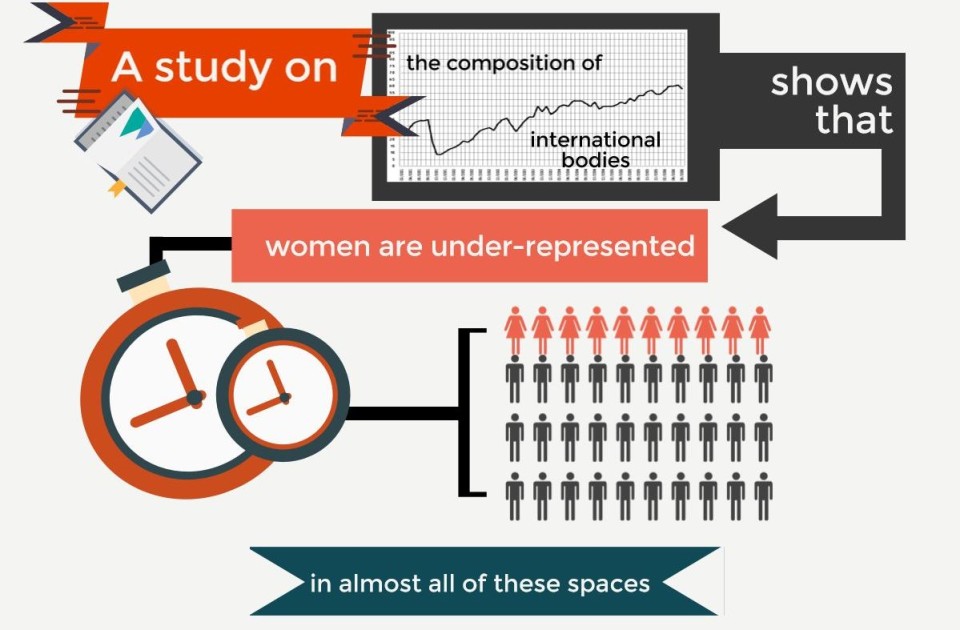More Than Fair: GQUAL Campaign Mobilizes Law to Change Picture of International Justice
Globally, women occupy only 33% of the 599 seats found on the 91 adjudicatory bodies of international law. But when one excludes the committees and working groups on the rights of women and children, that number drops to 24% of the remaining 533 seats. Only one woman sits on each of the Inter-American Court of Human Rights, the appellate body of the World Trade Organization, and the Committee on the Rights of Persons with Disabilities. The paucity of women on international bodies reveals a gross imbalance of power that tips against a community that makes up roughly half the world’s population.
During the first week of October, ambassadors, legal experts, practitioners, and activists from around the world gathered in The Hague to strategize changing this male-dominated picture of international justice during the GQUAL Campaign’s international conference marking its second anniversary. The Action Plan adopted at the conference begins with an important reminder that achieving gender equality on international bodies is not solely a policy of fairness and institutional legitimacy but an action mandated by law. Together with the International Human Rights Law Clinic at UC Berkeley School of Law, GQUAL released at the conference a working paper that identifies the international legal basis for the Campaign’s aim of realizing gender parity.
States establish the nominating and voting procedures that apply to any particular international body, making them ultimately responsible for this state of affairs. Though political will is needed to remedy the stark and pervasive gender imbalance on international bodies, reform should be guided by international law and State practice, both of which support the fair representation of women in global governance.
The positive obligation to eliminate sex-based discrimination is deeply rooted and widely reflected in international human rights law. Numerous instruments, most notably the Convention on the Elimination of all Forms of Discrimination Against Women, not only prohibit States from adopting discriminatory laws but also require that States work to dismantle obstacles that result in discriminatory outcomes for women. The working paper looks beyond CEDAW for additional support to further strengthen the legal foundation of the GQUAL Campaign.
We identified several human rights treaties and policy statements that embody the non-discrimination principle and which enumerate three international human rights norms that require gender equality within different contexts relevant to the GQUAL Campaign—the right of access to decision-making within public bodies; the right of access to equal opportunity in employment; and the right of access to justice. In short, women on equal terms with men, are entitled to shape our governments, to employment that reflects our capabilities, and to the protection, recognition, and advancement of international law.
The most robust support for gender parity comes from the right of access to decision-making, found within Article 25 of the International Covenant on Civil and Political Rights and which establishes the right to equal participation in public life. Interpreted in light of international instruments, Article 25 mandates State action to ensure gender parity in State-controlled appointment processes for international judicial and treaty monitoring bodies.
Although treaty-based, the right to decision-making and political participation largely has been developed through international resolutions and policy statements including UN General Assembly Resolution 66/120, the Beijing Platform for Action, the Millennium Development Goals, and the Sustainable Development Goals, as well as Security Council resolutions on women, peace, and security. These instruments reflect the widespread commitment of States to promote women’s equal access to decision-making across public entities, including the judiciary.
Recent treaties creating international courts and monitoring bodies have included provisions that mandate consideration of gender balance within the composition of the membership of these international law-making bodies. The Rome Statute of the International Criminal Court is a leading example. The statute mandates that gender representation be a consideration in the selection of judges. The results have been positive: currently the court is composed of 33% women, and women have occupied roughly 40% of all judicial seats since the ICC’s inception.
Requiring gender be a criterion for the selection of judges and treaty-monitoring committee members reflects a convergence of the human right to political participation with the principle of equitable distribution. Equitable distribution policies are a longstanding State practice to ensure fair representation of States from different geographic regions and often legal traditions in the composition of non-plenary bodies like the International Court of Justice.
This gender-inclusive approach to equitable distribution should guide reform for existing bodies that do not have provisions regarding gender representation in their founding documents. Given the current disparities and the slow pace of change based on the rules in place, reform is crucially needed. According to research presented at the conference, if we rely on current selection practices, gender parity likely will not be achieved until the year 2055. Arguments for reforming the selection of candidates for international bodies based on a gender-inclusive equitable distribution policy may be both a politically feasible and legally mandated catalyst for achieving gender parity through procedural reform.
International law should be harnessed to address the stark imbalance of power between men and women within international bodies. International law demands the reconstruction of the nominating and voting procedures that currently inhibit the equal representation of women on international courts and treaty monitoring bodies. The Action Plan of the GQUAL Campaign has already taken the first step by affirming that gender equality in the international arena, which requires State commitment to adopt affirmative measures, is neither an aspiration nor a privilege but a human right and fundamental principle of international law.
The GQUAL Campaign calls upon States to live up to their legal and moral obligations to shatter the glass ceiling, reform nomination and selection procedures, and to proactively work to achieve gender parity on international judicial and adjudicatory bodies.
This article was originally posted in INTLAWGRRLS

